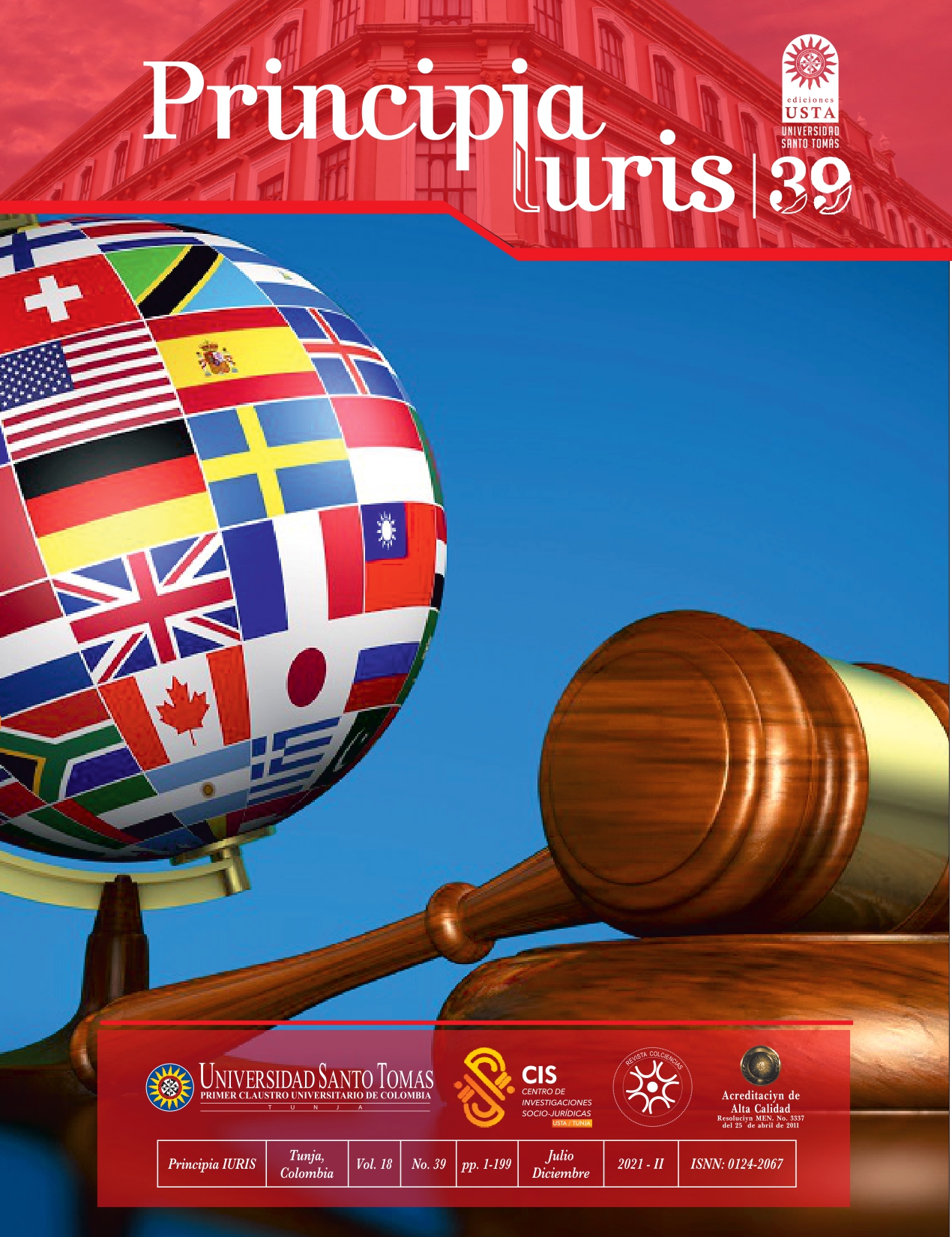CHANGE IN THE APPROACH TO THE CONSTITUTIONALIZATION OF CRIMINAL LAW AS PROTECTION OF THE LEGAL WELFARE OF THE ENVIRONMENT AND NATURAL RESOURCES IN THE 21ST CENTURY
Main Article Content
Abstract
Article Details
Por medio de esta comunicación certifico que el artículo que estoy presentando para posible publicación en la revista institucional impulsada de la Facultad de Derecho de la Universidad Santo Tomás seccional Tunja, Principia Iuris, es de mi entera autoría, siendo sus contenidos producto de mi directa contribución intelectual.
Todos los datos y referencias a publicaciones hechas están debidamente identificados con su respectiva nota bibliográfica y en las citas que se destacan como tal.
Por todo lo anterior, declaro que el material presentado se encuentra conforme a la legislación aplicable en materia de propiedad intelectual, y por lo tanto, me hago responsable de cualquier reclamación relacionada a esta.
En caso de que el artículo presentado sea publicado, manifiesto que cedo plenamente a la Universidad Santo Tomás seccional Tunja los derechos de reproducción del mismo y accedo a las modificaciones que de forma se requieran para adaptarse a la estética de la revista. Como contraprestación de la presente cesión, declaro mi conformidad de recibir (2) ejemplares del número de la revista en que aparezca mi artículo.
References
BBC NEWS. (2014). Bhopal: el desastre que envenenó a 500.000 personas. https://www.bbc.com/mundo/noticias/2014/12/141202_india_bophal_tragedia_indemnizaciones_ac
BBC NEWS. (2018). El descomunal proyecto que quiere devolver la vida al fondo del Aral, el mar que desapareció en medio de Asia. https://www.bbc.com/mundo/noticias-44332773
CONFERENCIA DE LAS NACIONES UNIDAS SOBRE EL MEDIO AMBIENTE HUMANO. (1972, junio 16). Declaración de Estocolmo sobre el medio ambiente humano. http://www.ordenjuridico.gob.mx/TratInt/
Derechos%20Humanos/INST%2005.pdf
CONGRESO DE LA REPÚBLICA DE COLOMBIA. Ley 599 de 2000. Por la cual se expide el Código Penal. Diario Oficial 44.097 del 24 de julio de 2000. http://www.secretariasenado.gov.co/senado/basedoc/ley_0599_2000.html
CONGRESO DE LA REPÚBLICA DE COLOMBIA. Ley 906 de 2004. Por la cual se expide el Código de Procedimiento Penal. Diario Oficial 45.658 del 1 de septiembre de 2004. http://www.secretariasenado.gov.co/senado/basedoc/ley_0906_2004.html
CORTE CONSTITUCIONAL DE COLOMBIA, Sala Plena. Sentencia C-542 de 1993 (M.P. Jorge Arango Mejía; 24 de noviembre de 1993). https://www.corteconstitucional.gov.co/relatoria/1993/c-542-93. htm#:~:text=C%2D542%2D93%20Corte%20Constitucional%20de%20Colombia&text=Quebranta%20la%20Constituci%C3%B3n%20una%20norma,propias%20o%20de%20un%20semejante.
CORTE CONSTITUCIONAL DE COLOMBIA, Sala Plena. Sentencia C-565 de 1993 (M.P. Hernando Herrera Vergara; 7 de diciembre de 1993). https://www.corteconstitucional.gov.co/relatoria/1993/C-565-93.htm
CORTE CONSTITUCIONAL DE COLOMBIA, Sala Plena. Sentencia C-431 de 2000 (M.P. Vladimiro Naranjo Mesa; 12 de abril de 2000). https://www.corteconstitucional.gov.co/relatoria/2000/c-431-00.htm
CORTE CONSTITUCIONAL DE COLOMBIA, Sala Séptima de Revisión. Sentencia T-881 de 2002 (M.P. Eduardo Montealegre Lynett; 17 de octubre de 2002). https://www.corteconstitucional.gov.co/relatoria/2002/t-881-02.htm
CORTE SUPREMA DE JUSTICIA DE COLOMBIA, Sala de Casación Penal. Rad. N°. 33.254 (M.P. José Leonidas Bustos Martínez; 27 de febrero de 2013). http://www.cortesuprema.gov.co/corte/wp-content/uploads/relatorias/pe/
b2mar2013/33254(27-02-13).doc

